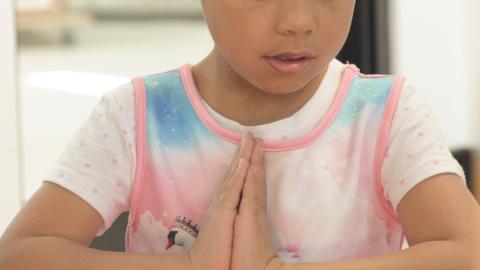It is important for children to know that they are loved by God, their family, and their teachers.
“Spiritual wellbeing relates to our sense of meaning and purpose. It can include our connection to culture, religion or community and includes the beliefs, values and ethics we hold.”
The Wellbeing Framework for Schools, NSW Government Education and Communities

Download the Spiritual Child printable resource
Curriculum
Early Years Learning Framework (ELYF)
- Children have a strong sense of identity
- Children are connected with and contribute to their world
- Children have a strong sense of wellbeing
- Communicates ways to be caring, inclusive and respectful of others. (PDe3)
- Communicates stories of their own family heritage and the heritage of others. (HTe-1)
- Understands and responds to literature read to them. (ENE-UARL-01)
- Communicates effectively by using interpersonal conventions and language with familiar peers and adults. (ENE-OLC-01)
- God loves every person infinitely. ‘Life and physical health are gifts entrusted to us by God’ and it is everyone’s responsibility to not only take care of oneself but also look to the needs of others. (Catechism of the Catholic Church – CCC2288)
Families
Read (2 mins)

Spirituality supports the wellbeing and mental health of the child.
In Catholic education we recognise spirituality as one of the elements of the whole child. A child, made in the image of God is a spiritual person, an intellectual person, a social and emotional person, a physical person and a cultural person.
Celebrating the spiritual child involves finding opportunities to nurture their spiritual growth. This includes activities such as praying together, reading bible stories, spending time in nature, discussing religious symbols and reflecting on what they are thankful for and what they feel when they talk about God.
Spirituality can be expressed differently by each child, each family and each community. In Catholic education it connects children in a faith community. It gives them security and belonging, offers wonder and reminds them that they are deeply loved.
“Spiritual wellbeing relates to our sense of meaning and purpose. It can include our connection to culture, religion or community and includes the beliefs, values and ethics we hold.”
The Wellbeing Framework for Schools, NSW Government Education and Communities
Explore (10 mins)

Some ideas for learning in the everyday:
- Set up a sacred space at home or outdoors.
- Pray with your children.
- Share Bible stories.
- Talk about God and His Son Jesus.
- Take a walk in the garden and talk about nature – God’s creation.
- Model for and encourage your child to act with kindness in the world.
- Say thank you to God for all the wonderful things in the world.
Teachers
Reflect (30 mins)

Reflect on your knowledge and practice. Consider the EYLF, NSW Syllabus and LPs:
- Where have these children come from?
- Where are you taking them?
Think about the learning that happens in your classroom. How do you complement wellbeing through spiritually in your classroom?
What are some characteristics of the early learner that attribute to being spiritual?
After watching the video, what do you want parents to know and understand about the ethos of Catholic schools?
This is an opportunity to talk about experiences in your classroom that foster the ‘spiritual child’.
Engage (45 mins)

Engage in a learning conversation with parents. Suggested conversation starters:
- What did you see in the video that challenges what you think about teaching the ‘whole child’?
- How are other elements of the whole child evident across your classroom and school day? (intellectual, physical, social/ emotional and cultural)
- What opportunities can you create at home to cater for the ‘spiritual child’? (Consider the activities in the Explore section.)